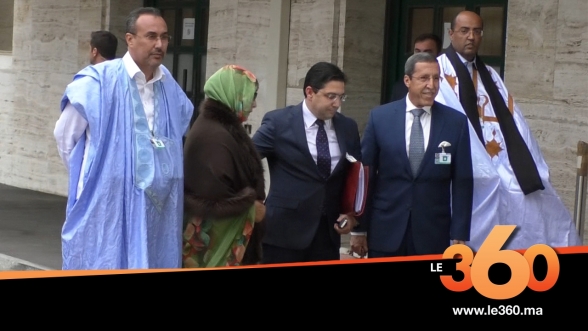 Minister of Foreign Affairs, Nasser Bourita, reiterated Morocco’s unwavering commitment to regional peace, and called for establishing a new regional order, in which Israel is a stakeholder rather than an “outsider in its own region”.
Minister of Foreign Affairs, Nasser Bourita, reiterated Morocco’s unwavering commitment to regional peace, and called for establishing a new regional order, in which Israel is a stakeholder rather than an “outsider in its own region”.
“Stay assured of Morocco’s unwavering and continuous commitment to doing what it takes to contribute genuinely to regional peace,” said the minister Friday at a virtual ministerial conference organized by the U.S. Department of State to commemorate the first anniversary of the Abraham Accords.
At the meeting, held with the participation of the U.S. Secretary of State Antony Blinken, and Foreign Ministers of the United Arab Emirates, Bahrain and Israel, Bourita welcomed “an opportunity to renew, together, our commitment to peace.”
“Today we are showing to the whole region and the world that brave actions must be taken by all of us in order to +push the envelop+ a bit further for the greater good.”
“The normalization of relations with Israel is indeed a historic event that is worth commemorating. It fostered new hope and paved the way for an unprecedented momentum,” Bourita said, noting that the tripartite US-Morocco-Israel agreement, signed last December, “is the bedrock of this renewed relationship.”
The signing of this agreement reflects the “profound links between the Kings of Morocco and the large Moroccan Jewish community,” he said, reiterating the Kingdom’s sincere appreciation for the central role of the United States as “guarantor to this process”.
“Winston Churchill was right when he said that peace will not be preserved by pious sentiments. Yes, the Normalization Accords are the result of good will, lots of it. But more than anything, we see action,” he added, recalling that since the signing of the trilateral agreement, many actions have been undertaken.
Bourita mentioned in particular the signing of more than 20 agreements covering various areas, the opening and operation of diplomatic representations, the creation of a platform for dialogue and cooperation involving five sectoral working groups, the opening of channels of communication between the business communities and the launch of twenty flights operated by two Israeli airlines.
The minister stressed further the need to work to demonstrate the benefits of regional peace and security, to revive the peace process, to address the animosity generated by normalization with “vigilance and solidarity” and to establish a new “regional order.
Bourita noted that the impact of the normalization process “is meant to be felt in generations to come,” stressing the need to work actively to demonstrate the benefits of regional peace and security, on people-to-people relations and on trade opportunities.
Regarding the relaunch of the peace process, a fundamental initiative, the minister said that for Morocco, there is no alternative to a two-state solution with an independent Palestinian state within the June 1967 borders.
Moreover, the status of Al Quds must be preserved as a common heritage of humanity and a symbol of peaceful coexistence for the followers of the three monotheistic religions, he insisted, recalling that the Kingdom has “always played a significant, still discreet role in facilitating peace in the past and is ready to pursue this role today”.
Bourita further noted that normalization has not only generated sympathy, but also animosity, which must be treated with “vigilance and solidarity”.
“For example, and unfortunately, one neighboring country decided to severe its relations with Morocco pretexting among other things the re-establishment of relations with Israel,” he stressed.
The Minister also highlighted the need to establish a new “regional order”, in which Israel is a stakeholder rather than an “outsider in its own region”.
“This new regional order should not be perceived as +against someone+, but rather +to benefit us all+. Also, this new regional order should be based on an updated joint assessment but also on how to generate opportunities that favor stability and development for all,” Bourita concluded.



